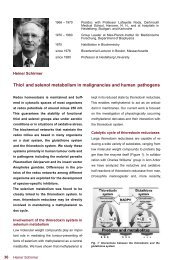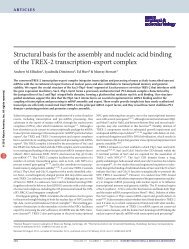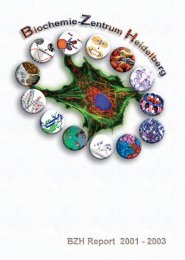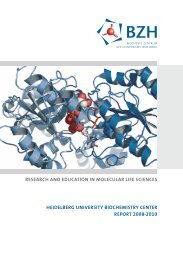Biochemie-Zentrum der Universität Heidelberg (BZH)
Biochemie-Zentrum der Universität Heidelberg (BZH)
Biochemie-Zentrum der Universität Heidelberg (BZH)
You also want an ePaper? Increase the reach of your titles
YUMPU automatically turns print PDFs into web optimized ePapers that Google loves.
Welcome to the <strong>BZH</strong>!<br />
The <strong>BZH</strong> (<strong>Biochemie</strong>-<strong>Zentrum</strong> <strong>der</strong> <strong>Universität</strong> <strong>Heidelberg</strong> – <strong>Heidelberg</strong> University Biochemistry Center) is<br />
a central institution of the <strong>Heidelberg</strong> University and combines biochemical research and teaching. Before<br />
you will meet us individually in this second scientific report of the <strong>BZH</strong>, let me introduce you to our center.<br />
Since its founding in 1997 the <strong>BZH</strong> has steadily grown to presently accomodate 13 research groups with a<br />
total number of about 200 scientific and non-scientific co-workers. Over 70% of the scientists are funded<br />
from external sources. Within the last four years we recruited Thomas Söllner (Full Professor, Medical<br />
Faculty), Frank Weber and Dimitris Liakopoulos (Junior group lea<strong>der</strong>s; Emmy-Nöther-Programme and<br />
SFB 638). While we had to say goodbye to Christian Ungermann (Professor, University of Osnabrück) and<br />
Prof. W. Merz (retired), we are glad to host Prof. Heiner Schirmer (retired 2007) for the near future. Due to<br />
changes in the Medical Faculty, we lost six research positions to Mannheim in 2007. However, as a partial<br />
compensation the <strong>BZH</strong> will receive two new junior groups, further un<strong>der</strong>lining the dynamic structure of the<br />
institution. Within the next two years, we aim to host almost equal numbers of research groups headed by<br />
professors and junior group lea<strong>der</strong>s.<br />
The <strong>BZH</strong> has not only grown in numbers, it has also established itself as a leading German university institution<br />
performing high-level interdisciplinary research. A mo<strong>der</strong>n department structure with flat hierarchies<br />
and complementary research interests creates an exciting atmosphere. The group lea<strong>der</strong>s follow their<br />
independent research plans, but most of them are embedded in a more general theme analysing dynamic<br />
protein assemblies that control a broad variety of cellular transport processes. These include membrane<br />
budding and fusion, transport to and across membranes, chromosome segregation and molecular clocks.<br />
The SFB 638 (Dynamics of macromolecular complexes in biosynthetic transport; Felix Wieland) was successfully<br />
launched in 2004 and has recently been renewed. Other activities include the SFB 544 (Control<br />
of tropical infectious diseases) and a number of national and international research networks. The majority<br />
of the <strong>BZH</strong> research groups are part of the Cluster of Excellence CellNetworks which started in October<br />
2006. The Cluster of Excellence allows us currently to recruit a junior group lea<strong>der</strong> to strengthen our ties to<br />
the just completed, interdisciplinary Bioquant Institute. The Cluster supports the infrastructure on the campus<br />
also by major investments in two technology platforms at the <strong>BZH</strong> – Mass Spectrometry (together with<br />
the ZMBH) and Macromolecular Crystallization. This improves our experimental toolbox which already<br />
includes protein crystallography, in vivo as well as single molecule imaging and one of the world leading<br />
centers for quantitative lipid analysis by mass spectrometry.<br />
The <strong>BZH</strong> is quite unique as the professors and staff belong to three different faculties (Medicine, Biosciences<br />
and Chemistry). Accordingly, the <strong>BZH</strong> offers training in biochemistry for about 800 students every year.<br />
We are dedicated to excellent training of the next generation of Molecular Life Scientists. The transition<br />
from the traditional Diploma to Bachelor and Master Programmes is almost completed. A number of<br />
Graduate schools and PhD Programmes in <strong>Heidelberg</strong> link the <strong>BZH</strong> with other institutions, including the<br />
ZMBH and the EMBL, to offer optimal training at the frontiers of Life Sciences.<br />
4 Introduction







